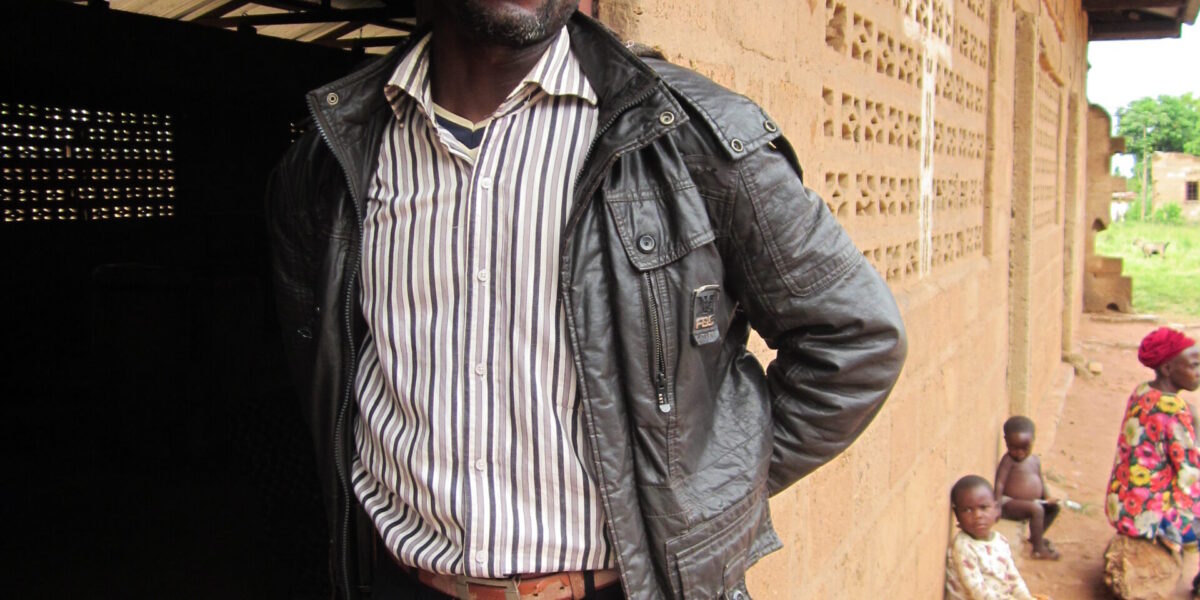ELKHART, Ind. (Mennonite Mission Network) – Jean-Richard Muteba Wa Mbuyi, a Mennonite pastor in Democratic Republic of Congo, spends a lot of time ministering inside La Prison Centrale de Mbuji Mayi. One day in March, while walking by the prison, strains of a song he heard outside the prison walls gripped his attention.
“We are dying of thirst. No water for days,” wafted through the razor-wire overhead.
Muteba, ordained in July 2012 during the 50th anniversary celebration of his denomination Communauté Evangéligque Mennonite au Congo (Evangelical Mennonite Church of Congo), laid aside all other responsibilities, and entered the prison gates. He passed from eye-blinding sunlight into a dark foyer where he asked the warden to allow him into the cell area. Since prison officials know him well, Muteba was quickly granted access to the rooms where approximately 800 people are held waiting for their trial dates.
In Congo, people accused of a crime are guilty until proven innocent. It can be several years before a judge reviews their cases. During this time, prisoners struggle to survive in cramped conditions, often 100 human beings packed into small concrete-block rooms with only a tin roof separating them from the fierce heat of the sun. Though prisoners’ families are expected to provide food for them, the prison normally assures enough water to sustain life – except for the preceding week when the water shortage in the city was more severe than usual. This provocation inspired the prisoners’ desperate song.
Muteba carried the news of the thirsty prisoners to the Sangilayi Evangelical Mennonite Church, where he is part of the pastoral team. The church leaders decided to disburse some of the funds that Henry De Leeuw, a surgeon and member of Yellow Creek Mennonite Church in Goshen, Ind., gives for prison ministry. De Leeuw began to share in this way when he visited Mbuji Mayi three years ago. Read more about that story, here.
With some of these funds, Muteba paid for several loads of water to be sent to the prison because Mbuji Mayi, a city of 3 million inhabitants, has no piped water. The delivery system consists of men and boys going to streams with six 50-gallon jugs strapped to their bicycles.
Muteba’s schedule includes weekly pastoral counseling visits at the prison. He used to fill his hours in the prison with preaching – and he is a powerful preacher, according to Rod Hollinger-Janzen, executive coordinator for Africa Inter-Mennonite Mission, who accompanied De Leeuw to the prison in 2010.
“I heard Muteba preach from John, chapter 8, about Jesus, the Truth that frees: ‘You will know the truth, and the truth will make you free.’ By the time Richard was through preaching, all the prisoners had jumped to their feet and were shouting ‘Amen,’” Hollinger-Janzen said.
However, Muteba has also learned through his theological studies at The Protestant University about the restorative power of listening.
Muteba hears about people who have been locked up for years on false charges, and about people who are starving because they have no family members in Mbuji Mayi to bring them food. Some people have been acquitted in a long-awaited trial, but remain in prison because they have no money for the exit fee.
Muteba is part of the congregational committee that prepares a monthly meal for all of the prison occupants. Sometimes, prison ministry funds also pay the exit fee. Many of the prisoners join the Sangilayi church when they are freed. One of them, Daniel Kasongo, is now part of the pastoral team.
Being Jesus’ hands and feet among captives was not always the path Muteba saw for himself. Though he was born into the Mennonite Church, Muteba rebelled against religion in his youth. He believed violence was his best means of survival. He envisioned a military career. He was working toward his black belt in karate.
“I had no intention of serving God in my life,” Muteba said. “I thought having many protective amulets would assure success and protect me from all danger.”
He purchased amulets to make himself invincible and to protect his wife, Adel Kanjinga, and their six children. He performed rituals that he now says were “hard and ridiculous.” However, despite his heroic efforts in the occult domain, his oldest son died and his other children were frequently ill.
In 1990, at age 20, Muteba realized the dark powers were not providing the good life he desired, and he decided to return to the church of his childhood. Soon after his return to Sangilayi, the congregation went to the mountains to worship God.
“All at once, I was shaken, by I didn’t know what power. I fell to my knees praying and praising God,” Muteba said. “I felt a call from God.”
As Muteba’s Christian wisdom, knowledge and faith grew, the Sangilayi congregation gave him increasing responsibilities. He began as a youth leader and moved to teaching and evangelism before becoming an ordained pastor last year.
“When I followed the ways of this world, I didn’t have a single happiness,” Muteba said. “Since my conversion and my decision to serve God, my life has totally changed. Today, I am a very happy man.”
Muteba said that his journey to great joy is a source of hope for the prisoners he visits. Rarely does Muteba enter the prison without hearing many thanks for the water his church provided when they were desperate; water that increases the fruitfulness of the gospel seeds he plants.
With more than a century of ministry in Congo, Mennonite Mission Network currently partners with the three Mennonite denominations in Congo, Africa Inter-Mennonite Mission, and Mennonite Church Canada through the Partnership Council in Congo.
“Richard Muteba shows us that happiness flows out of walking humbly in obedience to God’s call and serving others. The God who calls, also equips and provides,” said Steve Wiebe-Johnson, Mission Network’s director for Africa.







